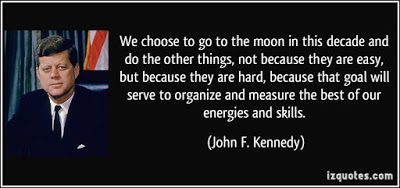Why Do Americans Keep Saying “We Can’t”?

Why do we keep telling ourselves that we can’t do things?
I keep hearing it over and over again: We can’t have . . . Universal health care. Public education that includes college. Higher minimum wage. Sustainable energy. Humane immigration reform. Safe harboring of refugees.
We can’t. We can’t. We can’t.
Every doomsday scenario is predicted by these naysayers: The economy will be ruined, taxes will go through the roof, terrorists will destroy this country and the poor will be worse off than ever before! It echoes like a chorus of lions, tigers and bears, oh my! If you believe all the hype, death panels will decide who gets to live and zombies will eat our brains out.
There are a lot of things that are difficult. There is much we haven’t yet figured out how to do. But if we value something–and if we want to do it–we should set it as our goal and work towards it. We should at least try our best before coming to the conclusion that it can’t be done.
In his May 25, 1961, address to Congress, President John F. Kennedy said:
“I believe that this nation should commit itself to achieving the goal, before this decade is out, of landing a man on the moon and returning him safely to the earth.”
President Kennedy gives us an example that we should model today. It is empowering to name a goal and make a commitment to it. On July 16, 1969, the first human being stepped foot onto the moon. Had JFK not made a public commitment to this goal AND then put resources behind it, it is unlikely that it ever would have been achieved. This is what leadership looks like.
We can apply Kennedy’s words to our current national debate on health care, poverty, immigration reform, environmental sustainability and any number of other issues: We should say what we want to do, set a timeline, then focus our attention and resources to achieve that goal. I’m sure many people said Kennedy was ridiculous and that travel to the moon was impossible. Those are the same kinds of folk who today say that universal health care is impossible and that environmental sustainability can never be achieved.
Some of these challenges may be difficult, but most Americans like to believe they are good at doing difficult things. We went from horse & buggies to cars, airplanes and a-man-on-the-moon in a few decades while also fighting two world wars and pulling out of a great economic depression. In light of all that history, it’s more than a little embarrassing when our first response today is “we can’t.”
The problem standing in the way is not a lack of technology. The real crisis is a lack of vision. We can figure out the nuts & bolts of a problem. What we need first is to have the courage to name our goal and make a commitment to it with specific numbers and dates.
When I’m faced with a problem, I don’t waste my time whining and moping around saying “it can’t be done” without even attempting to put a plan together. Yet, that is exactly what Americans are doing. We should be embarrassed that we have allowed ourselves to be lulled into thinking we can’t do so many things that are, in fact, very do-able.
We know they are very achievable because most of these have, in fact, been done before. Other nations around the world are far head of us in transitioning to renewable energy and have long ago settled the universal health care debate. We know it is possible to significantly reduce, if not downright eliminate, poverty: Over a century ago, the vast majority of our citizens wallowed in industrial revolution-era sweatshops, but their descendants enjoyed a middle class lifestyle. Dramatic change in a short span of time is very possible, even though many people said it could never be done.
There will always be naysayers. People who have power and money tend to be conservative by the simple fact that they like things the way they are now. They are hesitant–if not downright hostile– towards change, simply because they are doing well now. Their power and money gives them a big soapbox with a huge megaphone to project their message. They want us to believe that change is impossible. It’s our job not to fall for it.
Let’s save “we can’t” for things like time travel, light sabers and crisscrossing galaxies at the speed of light. But who knows, maybe some day in the future those will be possible, too. These other challenges are, in fact, very much achievable.
Visit Frank Lesko’s Blog “The Traveling Ecumenist”

